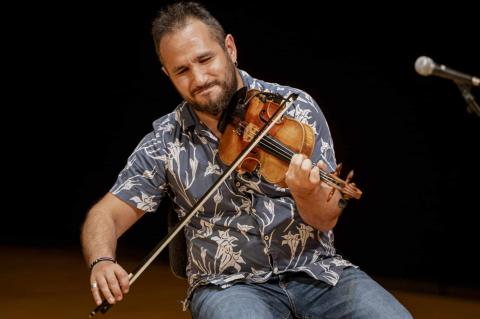Berklee Valencia Contemporary Performance Instructor Federico Nathan on Building a Music Career on His Own Terms

Tato Baeza
The son of a violinist, Nathan first picked up the violin at the age of 8 but soon realized that he did not enjoy playing classical music. It was not until he learned to play other instruments—drums and guitar—as a teenager that he started to appreciate the violin.
Breaking free from the confines of traditional violin playing, Nathan began to use the instrument to compose music in genres beyond classical. Now with over 20 years of experience, the seasoned composer has successfully made this eclectic style the cornerstone of his music career.
“I didn’t really enjoy the violin until years later, and I was certain when I really started to experiment with it as a tool for music other than classical,” Nathan says. “I was playing rock and pop, and I was starting to compose some music, so then I started to enjoy the instrument more.”
While proudly serving as a soloist in ensembles and orchestras worldwide, including the YouTube Symphony Orchestra, National Orchestra of Spain, and Holland’s Metropole Orchestra, Nathan also developed several of his own music groups and projects, infusing his signature style into his work.
“It was a spiritual need to make my music and to present what I wanted to do,” Nathan explains. “But of course, to make a living, life is a balance of what you want to do and what you have to do.“
In 2013, Nathan established the string quartet Cuareim Quartet with his friend of 21 years and violinist Rodrigo Bauzá, violist Olivier Samouillan, and cellist Guillaume Latil. They combined their diverse music backgrounds to compose their own music that combines several genres from around the world, including jazz.
Using this traditional band formation to play modern compositions marked the realization of a dream for Nathan. While the band plays world music, they choose a few genres based on a theme for each of their albums.
For example, Cuareim Quartet’s second album, Danzas, with percussionist Natascha Rogers, released in 2019, focuses on dances from around the world. Each band member studied folk music used for traditional dance styles from France, Peru, Argentina, Brazil, Cuba, the Balkans, and Réunion Island to create songs.
The group’s third album is based on jazz history and includes each of the genre’s styles. However, both albums incorporate elements from each band member’s background, including rock, classical, pop, and even traditional Balkan styles.
“It’s like our band is four worlds coming together and fusing styles, and whether we choose a concept or not, we always put a little of our soul in the music,” Nathan says.
As the bandleader of the Federico Nathan Project, Nathan takes a similar approach to fusing genres but adds a touch of improvisation into performances. The trio includes Berklee College of Music Boston alumnus and drummer Diego Pinera and pianist Baptiste Bailly.
Together they primarily play contemporary jazz and improvised music combined with elements of rock, classical music, and music from Nathan’s Uruguay.
Meanwhile, teaching at Berklee Valencia—an institution that pioneers and celebrates using instruments to make music outside their traditional genres—is an extension of Nathan’s approach to his music career.
“I am what I promote as an artist, erasing the barrier between classical music, popular rock, jazz, and folk music,” Nathan says. “We are not used to that because classical music is a strong tradition, so Berklee is quite open in that way.”
Nathan approaches teaching in this open and personal way, training students to see music without barriers.
Along with the performance aspect of a music career, Nathan also teaches his students about the grunt work that goes into being an artist. He explains that there will be times they have to handle their own living wages, management, promotion, and music recording.
Nathan has gained a wealth of knowledge from his pupils as well, and applies this to his own music, especially for rehearsing with his bands. Teaching students has introduced him to different backgrounds, understandings, cultures, and personalities that allow him to see, compose, and perform music in different ways.
Now, Nathan is forging a new path within his music career: going solo. He started his solo project in 2017, but stage fright during his first solo concert caused him to put it on hold—until now.
The violinist’s first solo album, AllOne, released in late 2022, encapsulates his goal to compose music on his own terms.
“It’s challenging in many ways, but at the same time, it is freeing because you are alone,” Nathan says. “You can do whatever you want, and I’m really enjoying it.”
